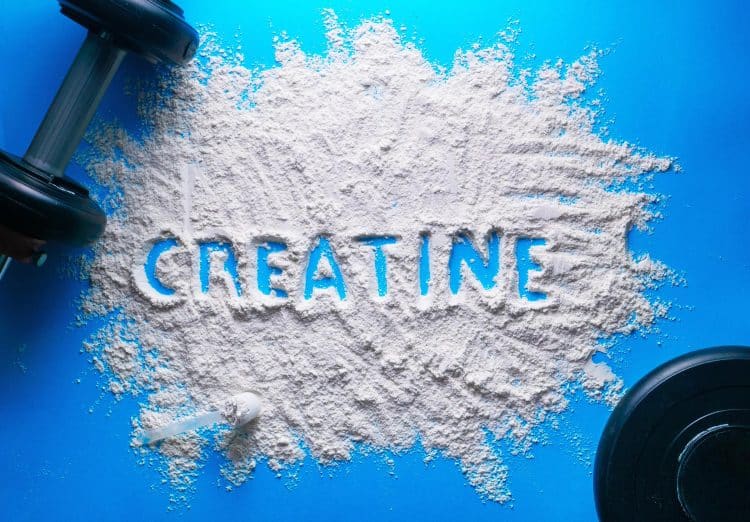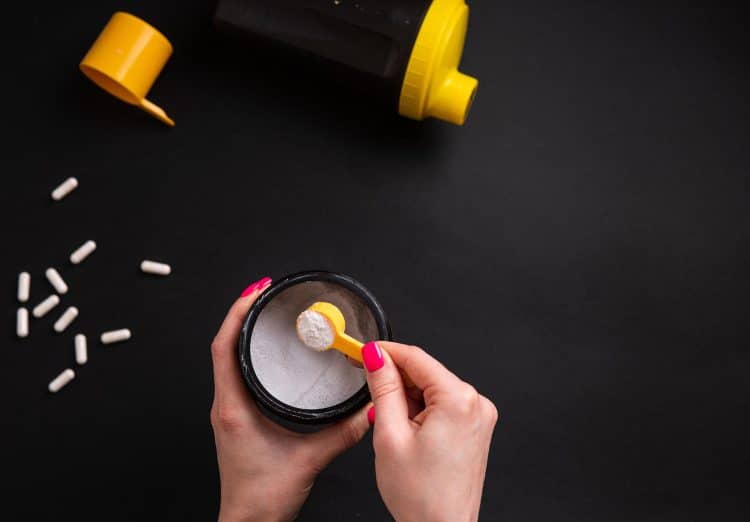Creatine is a popular sports nutrition supplement and a hit amongst bodybuilders. It is considered an ergogenic—performance-enhancing—supp. Creatine can be produced naturally in the liver and can be obtained from the diet.
Creatine can help with energy production during brief and high-intensity exercises such as weightlifting or sprinting.
Studies reveal that creatine can enhance muscle mass, strength, and exercise performance. However, besides its many benefits, the supplement is criticized by many for its alleged side effects. Notably, there is no empirical evidence to support these claims. [1]
Before exploring whether and how creatine is associated with body weight, let’s discuss the nature, composition, and effects of creatine.
Understanding Creatine

Creatine is an organic compound found naturally in muscle cells. It consists of arginine amino acids and glycine. Creatine is also found in natural food sources like meat, fish, and other poultry. Plus, creatine supplements have gained popularity among bodybuilders and athletes engaged in physically intensive sports.
Creatine supplements are similar to amino acids as they are composed of essential compounds that help build protein in your body. While 95 percent of the body’s creatine is stored in the muscles, five percent is found in the brain.
The creatine in your skeletal muscles is stored as creatine phosphate. This substance binds to the ADP (adenosine diphosphate) to be rendered as adenosine triphosphate (ATP), which serves as your body’s and brain’s energy fuel. [2]
Creatine Composition
Creatine comprises three core amino acids—arginine, glycine, and methionine. If you are concerned about your calorie intake due to creatine ingestion, you should know that most creatine supplements on the market deliver zero calories per serving.
How Does Creatine Work in Your Body?
Creatine aids in maintaining a continuous supply of energy to your muscles while exercising. It is also essential for your brain, heart, and the functioning of other tissues. Notably, it is possible to have a low creatine reserve in your muscles despite it being produced naturally in the body.
In case of creatine deficiencies or for muscle-building purposes, it can be consumed as a supplement. So, if you plan to take a creatine supp, it is important to understand that the compound will bind with a phosphate molecule to form phosphocreatine. Phosphocreatine provides your body with instant energy—powering high-intensity performances. With proper creatine supplementation, you can expect an increase in ATP availability, providing your body with extra strength, energy, and endurance.
Notably, creatine does not show instant results. It takes time for creatine to saturate your muscles. Creatine saturation occurs when your body has enough creatine reserves, and the dormant chemical compound starts working its magic.
Can Creatine Make You Fat?

There is much discussion on whether creatine can build on your body fat reserve. Creatine doesn’t have calories of its own and won’t make you fat unless you’re on a calorie surplus. On a calorie surplus, you consume more calories than you expend in a day.
An athlete trying to build muscle mass and strength need more calories. When the body is put through rigorous training, it will burn excess calories as fuel instead of reserving them as fat.
Some studies indicate that creatine retains water inside your muscles which causes them to swell. Lean and muscular people retain water in their muscles during the initial creatine intake phase. Therefore, weight gain associated with creatine supplementation may be due to water retention. [3]
If your body has anything ranging from normal to higher body fat levels, the water retention from creatine intake may not show in your muscles. This is because the muscles are already covered by fat instead of water. So, if you want to build bigger, stronger, and fuller muscles, creatine is worth a try!
Can Creatine Make You Gain Weight?
Creatine can help you gain muscle mass. However, you need to put in the hard work in the gym. It is certainly not as simple as gulping down creatine and waiting for your muscles to pop out.

To make creatine work, you will need to trian hard. Creatine turns into ATP in the body, essential for generating energy. The ATP is then catalyzed rapidly in the muscles, helping them recover after intense training sets.
The energy boost can help improve your performance in the gym, which can lead to gaining muscle mass.
For some, creatine consumption can initially accompany bloating, especially during the loading phase. However, the bloating balances out as your body reaches creatine saturation.
[Related: Weight Gain Calculator]
Creatine Loading and How it Affects Your Body Weight
In the creatine loading phase, athletes consume 20 to 25 grams of protein every day to achieve muscle saturation quickly. This phase is followed by the maintenance phase, which involves consuming three to five grams of creatine every day.
The loading phase may cause some water weight gain, but fluid retention might fade as you build lean muscle mass.
Creatine Dosage

Whether seeking a conscious weight gain or not, creatine intake must be limited to the recommended dosage. People eating an omnivorous diet—containing 1-2 grams of creatine derived from meat and fish—can achieve creatine saturation by consuming five grams of creatine four times a day for at least five to seven days.
You could maintain your creatine reserve by ingesting three to five grams of creatine daily. However, athletes and weightlifters who want strength and muscle gains should consume 5-10 grams of the compound daily. Check out our creatine dosage calculator to find out your daily creatine requirements.
Studies reveal creatine can help build lean muscle mass. So, creatine can help you gain weight without putting on body fat. Plus, it can promote faster recovery from injuries [4]. Creatine is a proven supplement for muscle growth and works for most body types. Furthermore, men and women alike can use a creatine supplement.
Safety
Creatine is considered safe, but that doesn’t mean all supplements available on the market have the same standards. [5]
Taking creatine for an extended period could have side effects, though not very prominent. Some of the better-known side effects of creatine over-dosing include weight gain, breathing difficulty, anxiety, fatigue, headache, fever, nausea, vomiting, and stomach upset, among other conditions. You should consider lowering your dosage if you are experiencing any such issues.
Creatine isn’t recommended for people dealing with health conditions such as diabetes, kidney, or liver disease. Plus, folks below 18 and pregnant or nursing women aren’t advised to supplement with creatine. Finally, if you are on medication, it is best to consult a healthcare professional before supplementing with creatine.
Things To Do if You Gain Weight Supplementing with Creatine
Although the weight gain from taking creatine could be temporary, here’s what you can do for some quick relief:
- Regulate your sodium intake: Excessive sodium accumulation in the body can cause fluid retention. Eating more fresh fruits and vegetables and reducing processed and fast food intake can help keep your sodium intake low and lower the chances of water weight accumulation. [6]
- Limit your carb intake: Carbs are undoubtedly great for energy, but a high-carb diet can cause you to gain weight. Reducing carbohydrate intake can be helpful, especially when combating weight gain.
- Get the best quality creatine: Also, stick to a daily dosage to avoid side effects.
- Train hard: Intense workout sessions can reduce water retention. The more you work out, the lesser water your body will accumulate, and the more fluid your body will flush out in the form of sweat.
FAQs
Is it safe to consume creatine?
Creatine consumption has no reported adverse health effects when taken in recommended dosage. It is best to consult a medical professional if you have any underlying medical conditions before starting creatine supplementation.
How can I get started on creatine?
Although not always necessary, the loading phase is one of the most effective ways to start creatine supplementation. Maintaining a dosage of three to five grams for beginners and five to ten grams for high-level athletes can work well.
What is the most popular form of creatine used by athletes?
Creatine monohydrate is an extensively used supplement used by high-performance athletes.
Can I lose the weight that I gained from creatine supplementation?
Creatine will not make you lose or gain weight. If you are worried about weight gained by water retention, yes, you can lose that weight when you stop taking the creatine supplement.
Can women take creatine?
Yes, women can take creatine, especially if they plan to improve their exercise capacity, build lean muscle mass, strengthen muscles and improve recovery speeds.
Learn more about Creatine:
- Creatine Before and After: How This Popular Supplement Affects Your Body
- 5 Best Natural Bodybuilding Supplements: Sculpt Your Body Into a Work of Art
- Creatine Pros and Cons: Cracking the Code
- Female Muscle Growth: Unleash Your True Potential
- How Long Until Pre-Workout Kicks In: A Guide to Maximizing The Supplement
- Creatine Powder vs. Pills — Which Should You Get?
- Does Creatine Expire? (The Ultimate Guide)
- How Long Does Creatine Stay in Your System—Explained
Bottom Line
To summarize, there is no evidence to prove that creatine is directly related to weight gain and obesity. On the other hand, this supplement is not a shortcut to building muscles.
Lastly, individuals with health conditions like liver issues must consult a physician before starting creatine supplementation.
References:
- Guingand, Deborah L. de, et al. “Risk of Adverse Outcomes in Females Taking Oral Creatine Monohydrate: A Systematic Review and Meta-Analysis – PMC.” PubMed Central (PMC), 15 June 2020.
- Creatine: MedlinePlus Supplements.” Creatine: MedlinePlus Supplements, Accessed 9 Sept. 2022.
- Creatine Supplementation Increases Total Body Water Without Altering Fluid Distribution – PubMed.” PubMed, 1 Mar. 2003.
- Cooper, Robert, et al. “Creatine Supplementation with Specific View to Exercise/Sports Performance: An Update – PMC.” PubMed Central (PMC), 20 July 2012,
- Wax, Benjamin, et al. “Creatine for Exercise and Sports Performance, with Recovery Considerations for Healthy Populations – PMC.” PubMed Central (PMC), 2 June 2021,.
- “Creatine Monohydrate Gras Notification” – https://www.fda.gov/media/143525/download
- Rakova, Natalia, et al. “Increased Salt Consumption Induces Body Water Conservation and Decreases Fluid Intake – PMC.” PubMed Central (PMC), 17 Apr. 2017.


